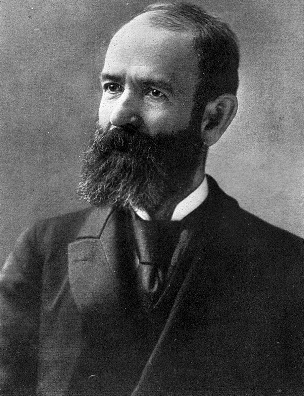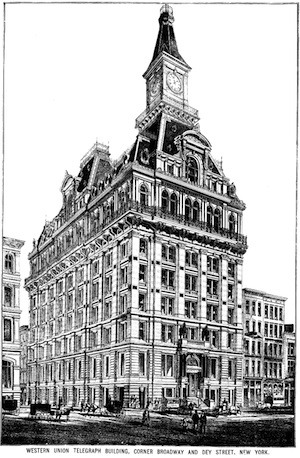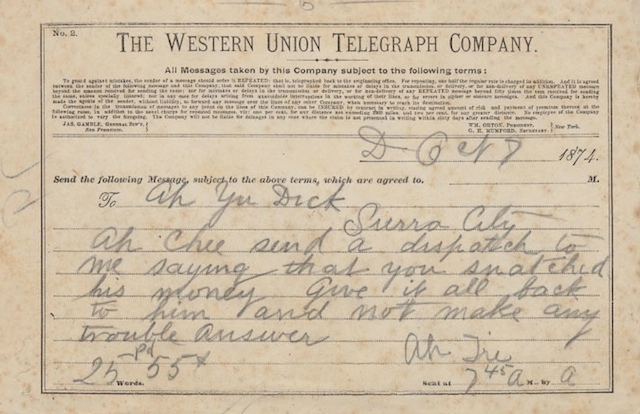Mephistopheles

This schemer's name was Jay Gould. Railroad stock speculator and ally of corrupt politicians like William Marcy "Boss" Tweed of New York, by the late 1860s Gould had become infamous for his attempt to manipulate the nation's gold supply, which backfired in the stunning "Black Friday" financial panic of 1869.
A decade later, with his interest in scores of railroads, Gould saw that "the telegraph and the railroad systems go hand in hand," as he put it. But the Board of Western Union refused to have anything to do with him. And so Gould, armed with his own newspaper, The New York World, set out to conquer the telegraph service via financial hijinks and public pressure. First he organized a bear raid on the company, lowering the value of its stock. Then he constructed several smaller telegraph firms and denounced Western Union as an unscrupulous monopoly.
By 1881, Gould had not only sold his competing companies to Western Union, but he successfully pulled down the price of Western Union shares to the point where he could easily buy out the enterprise. So proud was he of his conquest that he personally relocated to Western Union's corporate HQ—"a massive, bomb proof citadel" and a "gloomy pile, six stories high, costing $2,200,000," as the Gilded Age historian Matthew Josephson described it. "Here Gould's person at least was safe. For the pitiless tactics he pursued were not such as to make him immune from physical danger."
Once installed as the dominant proprietor of the nation's telegraph system, public trust in the confidentiality of Western Union transmissions evaporated. Gould "scanned the telegraph, or manipulated it, as an open book to the secrets of all the marts," Josephson wrote.
No one could ever demonstrate that, in fact, Gould read the telegraphic correspondence of his competitors and enemies. But that would have been difficult to expose, given Western's already corrupt relationship with Associated Press.
Never encourage or support

Two years after the conclusion of the Civil War, the two biggest competing telegraph news services—Western Associated Press and New York Associated Press—effectively merged with a joint executive board. (Note that, at the time, the "Western" Associated Press included newspapermen from St. Louis, Chicago, Detroit, Cleveland, Cincinnati, and Indianapolis.)
The duo then cut a deal with telegraph operator Western Union. In exchange for exclusive access to Western Union, both APs promised never to "encourage or support any opposition or competing Telegraph Company." In turn, newspapers that subscribed to AP pledged to use AP only. And no new newspaper could join the news cartel without the support of current AP members in the region.
Thus, "if a newspaper publicly criticized the AP, it risked losing its membership," notes the historian Paul Starr. "Not only, therefore, did AP itself enjoy a monopoly position; its member newspapers could also protect themselves against local competition." When Gould finally sold his unprofitable New York World to Joseph Pulitzer, the latter paid Gould's exorbitant asking price because of the outlet's invaluable AP franchise.
And so Associated Press and Western Union effectively created a criticism-proof information system that married content creation with a national network, and in which few competitors could surface. When Sumner's partner Henry George tried to start a paper in San Francisco in 1879, the AP refused to sell him a franchise. He then relocated to Philadelphia to start his own news company, but Western Union cut him off from the West's only telegraph cable. His and Sumner's investment collapsed.
Second, the public
All this mischief was an open secret. "Western Union has bound the Associated Press," concluded an 1874 United States Senate investigation, "as part of the price paid for the transmission of its news, to oppose any other telegraph company, and then points to the columns of the papers as evidence that neither the journals themselves nor the public desire a change."
Summoned to a hearing in the House of Representatives, Western Union's President brushed these concerns aside. "The mere fact of monopoly proves nothing," he declared. "The only question to be considered is, whether those who control its affairs administer them properly and in the interest, first, of the owners of the property, and second, of the public."

The Senate held yet another inquiry about Western's telegraph shenanigans following the "Stolen Election of 1876," as it was called. The investigation was presided over by a Republican. "The telegrams, which the Democrats were never able to review, were kept for two months, returned to Western Union, and destroyed," writes Starr, save for some that discredited Tilden. That year the Supreme Court ruled that the Fourth Amendment guarded the confidentiality of the postal mails... but the decision did not extend to the telegraph.
For the next decade, every flavor of social reformer called for a government-subsidized competitor to Western Union, especially the Populist Party. In addition to Western Union's cozy relationship with AP, critics complained of high rates. So did the conservative National Board of Trade. By 1890, even prominent Republicans such as department store magnate John Wanamaker joined the chorus. "That man must be willfully blind who does not see the vast and rising tide of public sentiment against monopoly," he warned.
But the collapse of the Populists after the election of 1896 and Western Union's enormous political power kept this reform movement at bay. Not until 1910 did Congress clearly define both the telephone and telegraph as common carriers. By then many newspapers had glommed onto a new service: Marconi's wireless telegraph.
Then and now
In many ways this story is far field from our contemporary debates about network management, file sharing, and the perils of protocol discrimination. But the main questions seem to remain the same—to what degree will we let Western Union then and ISPs now pick winners and losers on our communications backbone? And when do government regulations grow so onerous that they discourage network investment and innovation?
These are tough questions, but the horrific problems of the "Victorian Internet" suggest that government overreach isn't the only thing to fear. In 1876, laissez-faire "freedom for all" meant (in practice) the freedom for Henry Nash Smith to read your telegrams if he didn't like who you supported for President. It meant freedom for Associated Press to block criticism of Western Union, and even to put potential critics and competitors out of business. And it meant freedom for a scoundrel to hijack the system at his leisure.
Sure enough, the technologies and debates are different. Still, one wonders what Charles A. Sumner would say today if told that net neutrality is a "solution to a problem that hasn't happened yet."
Further reading
- Daniel Czitrom, Media and the American Mind: From Morse to McLuhan
- Matthew Josephson, The Robber Barons
- Paul Starr, The Creation of the Media: Political Origins of Modern Communications
- Tom Standage, The Victorian Internet
reader comments
167